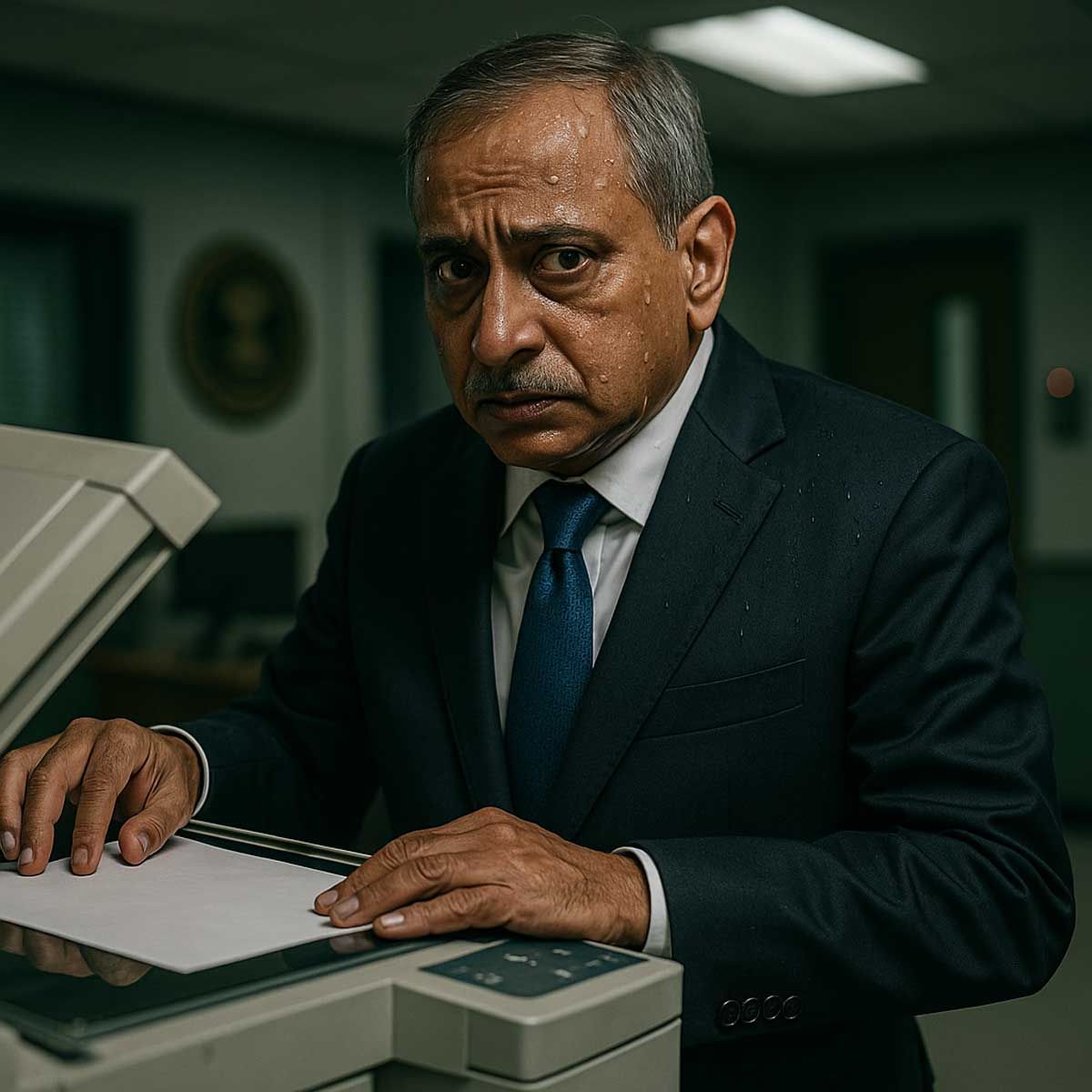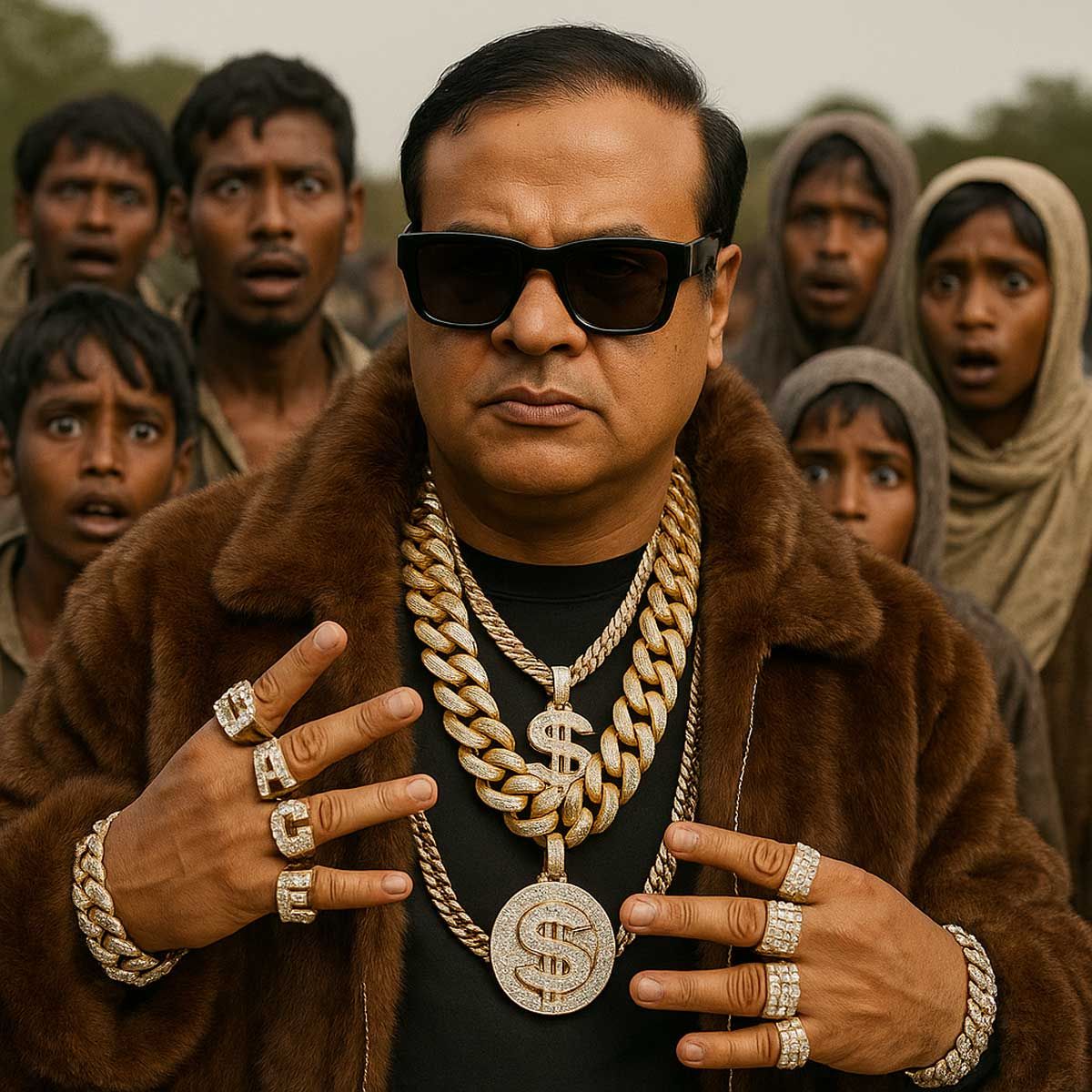More Coverage
Twitter Coverage
Satyaagrah
Written on
Satyaagrah
Written on
Satyaagrah
Written on
Satyaagrah
Written on
Satyaagrah
Written on
JOIN SATYAAGRAH SOCIAL MEDIA
"हुर्रियत स्वाहा": Once Geelani’s right-hand man, Advocate Mohammad Shafi Reshi ditched separatism in 2025, slammed Hurriyat’s failures, swore loyalty to India, and shook J&K’s shifting political scene post-Article 370, earning Amit Shah’s nod for peace

On March 24, 2025, a surprising piece of news rippled through Jammu and Kashmir (J&K), a region long caught in the tangle of conflict, separatism, and hope for peace. Advocate Mohammad Shafi Reshi, a man who once walked alongside one of Kashmir’s most iconic separatist leaders, Syed Ali Geelani, announced he was done with that world. He didn’t just step away quietly—he publicly cut all ties with the All Parties Hurriyat Conference (APHC) and the Jammu & Kashmir Democratic Political Movement (DPM), groups he’d been linked to for years. Even more striking, he swore his loyalty to India, calling himself a “bona fide citizen” committed to the Indian Constitution. This wasn’t just a personal choice; it sent shockwaves through J&K’s political scene, hinting at a possible shift in a region that’s seen decades of unrest.
Who is Mohammad Shafi Reshi? Why did he make this move now? And what does it mean for Kashmir? Let’s unpack his story step by step, digging into his past, his reasons, and the bigger picture around him. Along the way, we’ll lean on real facts from trusted sources like The Hindu, Hindustan Times, Daily Excelsior, and Kashmir Despatch, all reporting on this as it unfolded in March 2025.
|
The Man Behind the Move: Who is Mohammad Shafi Reshi?
Mohammad Shafi Reshi isn’t a stranger to Kashmir’s political circles. Hailing from Gulberg Colony in Baghat, Srinagar, he’s a lawyer by trade—an advocate who’s spent years navigating the legal system. But his life wasn’t always about courtrooms and case files. For a long time, he was deeply tied to Kashmir’s separatist movement, a cause that’s shaped the region since the late 1980s. What made him stand out was his close connection to Syed Ali Geelani, a towering figure who spent his life pushing for Kashmir to break away from India and merge with Pakistan.
Reshi wasn’t just a bystander—he was an insider. Reports from The Kashmiriyat (March 24, 2025) call him a “close aide” of Geelani, while The Week (March 25, 2025) notes he once served as Geelani’s political secretary. That’s no small role. Geelani, who died in 2021, was the hardline face of the Hurriyat Conference, a coalition of groups formed in 1993 to unite separatist voices in Kashmir. Reshi’s position put him right in the thick of that ideology, helping shape strategies and spread Geelani’s vision of an independent or Pakistan-aligned Kashmir.
But Reshi’s separatist journey wasn’t limited to the Hurriyat. He also led the Jammu & Kashmir Democratic Political Movement (DPM), a lesser-known outfit he chaired until 2017. According to Kashmir Despatch (March 24, 2025), that’s when he first started pulling away from the DPM, stepping down as chairman and slowly distancing himself from separatist politics. It wasn’t a clean break back then—he stayed on the radar—but it was the beginning of a shift that would take years to fully play out.
So, who is Reshi today? He’s a man in his late 50s or early 60s (exact age isn’t public), a Srinagar resident with a legal career he now says is his focus. He’s not a flashy politician or a loud activist anymore. Instead, he’s someone who’s decided to rewrite his story, leaving behind a past that once defined him. To understand why, we need to look at where he came from and what Kashmir’s been through.
|
Kashmir’s Separatist Roots: The World Reshi Grew Up In
To get Reshi’s story, we’ve got to step back to the Kashmir of the 1980s and ’90s—a place where dreams of freedom clashed with guns and grief. After India’s partition in 1947, J&K joined India under tricky terms, thanks to Maharaja Hari Singh’s accession amid a tribal invasion from Pakistan. Article 370 gave it special status—its own constitution, flag, and autonomy over most internal matters. But that deal didn’t sit well with everyone. By the late ’80s, frustration over rigged elections (like the infamous 1987 vote), unemployment, and a sense of being sidelined by New Delhi boiled over.
That’s when militancy took off. Young Kashmiris, some trained across the border in Pakistan, picked up arms, and groups like the Jammu Kashmir Liberation Front (JKLF) and later Hizbul Mujahideen led the charge. Syed Ali Geelani, already a political voice through the Jamaat-e-Islami, became a key figure, rejecting India’s rule outright. In 1993, he helped form the APHC, pulling together 26 groups under one separatist umbrella (The Hindu, March 25, 2025). Reshi, likely in his 20s or 30s then, grew up in this storm. Like many, he was drawn to the cause—freedom, identity, and a Kashmir unshackled from India.
Geelani’s vision wasn’t subtle. He wanted Kashmir to join Pakistan, a stance that made him a hero to some and a threat to others. Reshi, as his aide, would’ve been part of the rallies, shutdowns, and heated speeches that defined those years. The 1990s were brutal—thousands died, Kashmiri Pandits fled the Valley amid targeted killings, and the Indian Army cracked down hard. For Reshi, this was the backdrop to his early career, shaping his worldview and his loyalty to Geelani.
|
The Slow Drift: Reshi’s Break from Separatism
Reshi’s exit didn’t happen in a flash—it was a slow burn. The first big clue came in 2017 when he left the DPM’s chairmanship. Kashmir Despatch (March 24, 2025) says he severed ties with the group back then and hadn’t been linked to the APHC or any separatist outfit since. Why 2017? We don’t have his diary, but the timing’s telling. That year, Kashmir was reeling from the 2016 unrest after Hizbul commander Burhan Wani’s killing—stone-pelting, curfews, and deaths had spiked. Maybe Reshi saw the toll it took, or maybe he felt the separatist path was losing steam. Either way, he stepped back.
For the next few years, he kept a low profile. He didn’t vanish—lawyers in Srinagar don’t just disappear—but he wasn’t waving the Hurriyat flag either. Then came 2019, when India scrapped Article 370, turning J&K into Union Territories and stripping its special status. It was a blow to separatists, who lost a legal peg for their autonomy argument. The region went into lockdown, and groups like the APHC were hit hard—leaders detained, funds choked. Reshi, already on the sidelines, might’ve seen the writing on the wall.
Fast forward to March 2025. On the 24th, he dropped his bombshell statement. The Kashmiriyat says he “publicly announced his complete disassociation” from the DPM and APHC (Geelani faction), slamming their ideology as a failure. He didn’t stop there—he warned he’d sue anyone tying his name to separatism and pledged allegiance to India. It was a full 180-degree turn, and it caught everyone’s attention.
Why Now? Unpacking Reshi’s Reasons
So, what flipped the switch for Reshi in 2025? He gave some answers himself. In his statement, reported by Kashmir Despatch (March 24, 2025), he said the APHC “has failed to address the legitimate aspirations and grievances of the people of Jammu & Kashmir.” That’s a hefty critique from someone who once helped run the show. He’s basically saying the separatist dream didn’t deliver—after decades of struggle, Kashmiris are still stuck with poverty, unrest, and no clear path forward.
Reshi’s not wrong about the ground reality. Post-2019, J&K’s seen changes—tourism’s up (21.1 million visitors in 2023, per Hindustan Times), roads and tunnels are being built, and militancy’s down from its ’90s peak. But it’s not paradise. Unemployment’s high, youth feel lost, and the internet bans of 2019-2020 left scars. Maybe Reshi looked at this and thought, “What’s separatism done for us lately?” He’s not alone—other ex-Hurriyat figures, like Shahid Saleem of JKPM, made similar moves in March 2025, per Daily Excelsior (March 25, 2025).
Then there’s his legal angle. Reshi stressed he’s doubling down on his career as an advocate, warning of “legal action” against anyone dragging him back to separatism (The Week, March 25, 2025). That’s a practical choice—lawyers thrive in stability, not chaos. With the Indian government cracking down on separatist funding under laws like the UAPA (two Hurriyat-linked groups were banned in March 2025, per India Today), staying tied to that world could’ve risked his livelihood or even his freedom.
And what about India? Calling himself a “bona fide citizen” committed to the Constitution (Kashmir Despatch) isn’t just words—it’s a signal. Post-Article 370, aligning with India might open doors—safety, opportunities, or just peace of mind. Home Minister Amit Shah praised Reshi’s move as a “step toward peace and unity” (The Hindu, March 25, 2025), suggesting official approval. Maybe Reshi saw a chance to reset his life in a Kashmir tilting toward New Delhi.
|
The Geelani Shadow: A Legacy Crumbles?
Reshi’s break hits harder because of who he was to Syed Ali Geelani. Geelani wasn’t just a leader—he was a symbol. Born in 1929, he joined Jamaat-e-Islami, won elections, and then turned to separatism full-time. His Hurriyat faction pushed a pro-Pakistan line, rejecting talks unless India budged. When he died in 2021 under house arrest, Kashmir mourned, but his dream didn’t die with him—until now, maybe.
Reshi’s exit, as The Kashmiriyat (March 24, 2025) notes, is a “blow to that legacy.” If Geelani’s own aide can walk away, what’s left of the cause? It’s not just Reshi—Shahid Saleem’s JKPM also ditched separatism in March 2025 (Daily Excelsior). The APHC, already fractured (Geelani’s hardline wing vs. Mirwaiz Umar Farooq’s moderate one), looks weaker than ever. With India’s grip tightening—bans, arrests, and a new generation less hooked on militancy—Geelani’s vision might be fading.
The Bigger Picture: J&K in 2025
Reshi’s move isn’t just his story—it’s part of a shifting J&K. Since Article 370’s end in 2019, India’s doubled down on integration. The region’s split into two Union Territories, elections happened in 2024 (National Conference won, per Hindustan Times), and statehood’s on the table. Amit Shah’s March 25, 2025, tweet (via The Week) called separatism “history in Kashmir,” tying it to Modi’s policies. He’s got a point—militant attacks are down, though not gone (three civilians died in Kathua, March 2025, per NDTV).
But it’s not all smooth. Critics like Omar Abdullah, J&K’s Chief Minister, say the 2019 changes ignored Kashmiris’ voices (Deccan Herald, January 26, 2025). Lockdowns, detentions, and rights concerns linger—Amnesty International flagged these in 2020. Reshi’s pivot might signal cracks in separatism, but it doesn’t mean everyone’s on board with India’s plan.
|
What People Are Saying
Reactions to Reshi’s move vary. Shah welcomed it, seeing it as progress (ProKerala, March 25, 2025). On X, users like @Sher_i_Kashmir (March 25, 2025) called it a “significant shift,” while @SaqibQashmiri wondered if more would follow. But not everyone’s cheering—some Kashmiris might see it as betrayal, though no big backlash has hit the headlines yet. Reshi’s legal threat might be keeping critics quiet for now.
What’s Next for Reshi and Kashmir?
For Reshi, life’s about law now. He’s made his stand—India over separatism—and he’s betting on a quieter future. For J&K, his choice could nudge others to rethink old loyalties, especially if development keeps rolling. But Kashmir’s story isn’t over. Separatism’s down, not out, and peace hinges on jobs, trust, and healing old wounds—like the Kashmiri Pandit exodus (Hindustan Times, January 20, 2025).
In the end, Reshi’s journey mirrors J&K’s own—messy, conflicted, and searching for a way forward. Whether his move’s a ripple or a wave, only time will tell. For now, it’s a bold step in a land that’s seen too many standstills.
Sources
- Kashmir Despatch (March 24, 2025): “Advocate Mohammad Shafi Reshi Cuts All Ties with APHC (G) and DPM, Reaffirms Allegiance to India” – Details Reshi’s statement, legal focus, and 2017 DPM exit.
- The Kashmiriyat (March 24, 2025): “Late Geelani’s Aide Advocate Shafi Reshi Cuts Ties with Hurriyat” – Confirms Reshi’s past with Geelani and his critique of APHC.
- The Hindu (March 25, 2025): “Separatism Has Become History in Kashmir: Amit Shah” – Covers Shah’s reaction and APHC context.
- The Week (March 25, 2025): “Relic of the Past? Amit Shah Hails Modi as Separatist Groups Sever Ties with Hurriyat” – Notes Reshi’s political secretary role and Shah’s comments.
- Daily Excelsior (March 25, 2025): “Ex-Hurriyat Leader Shahid Saleem Denounces Separatism” – Mentions Reshi alongside other defections.
- Hindustan Times (Various dates): Tourism stats, Article 370 fallout, and Pandit exodus context.
- India Today (March 11, 2025): “Government Bans 2 Kashmir-Based Groups” – UAPA crackdown context.
- ProKerala (March 25, 2025): “Unifying Policies of Modi Govt Have Tossed Separatism Out of J&K: Amit Shah” – Official perspective.
 Support Us
Support Us
Satyagraha was born from the heart of our land, with an undying aim to unveil the true essence of Bharat. It seeks to illuminate the hidden tales of our valiant freedom fighters and the rich chronicles that haven't yet sung their complete melody in the mainstream.
While platforms like NDTV and 'The Wire' effortlessly garner funds under the banner of safeguarding democracy, we at Satyagraha walk a different path. Our strength and resonance come from you. In this journey to weave a stronger Bharat, every little contribution amplifies our voice. Let's come together, contribute as you can, and champion the true spirit of our nation.
 |  |  |
| ICICI Bank of Satyaagrah | Razorpay Bank of Satyaagrah | PayPal Bank of Satyaagrah - For International Payments |
If all above doesn't work, then try the LINK below:
Please share the article on other platforms
DISCLAIMER: The author is solely responsible for the views expressed in this article. The author carries the responsibility for citing and/or licensing of images utilized within the text. The website also frequently uses non-commercial images for representational purposes only in line with the article. We are not responsible for the authenticity of such images. If some images have a copyright issue, we request the person/entity to contact us at This email address is being protected from spambots. You need JavaScript enabled to view it. and we will take the necessary actions to resolve the issue.
Related Articles
- In a heroic display, Garhwal Rifles soldiers valiantly repelled terrorists in Kathua by firing over 6,000 rounds, forcing the attackers to flee; meanwhile, 26 locals were detained amid a deepening investigation, as Uttarakhand mourns five brave soldiers
- Amidst Umling-la's peaks at 19,024 feet, the world's highest international fashion show set a record, Models showcased India's ethos and Ladakh's Pashmina with unprecedented fusion of fashion and culture, resonating with 'Vasudhaiva Kutumbakam'
- The ‘Sanghi propaganda’ trope on abduction and conversion of Sikh girls to Islam. Here is how this online tirade is an omen of impending danger
- “It’s like chess, you know. The Queen saves the King”: Yashovati - first regent queen of Kashmir married to King Damodara I who was kiIIed in a duel with Shri Krishna himself, Yashomati was pregnant than and was raised to the throne by Shri Krishna
- Nehru's Himalayan Blunders which costed India dearly - Pre-Independence
- All schools of Falah-e-Aam trust, an offshoot of outlawed Islamic organisation Jamaat-e-Islami to shut within 15 days, SIA revealed major illegalities, open fraud, and widespread encroachment of government lands by FAT: Jammu & Kashmir administration
- "Saddest thing about betrayal is that it never comes from your enemies": J&K Govt terminated Dr Bilal Ahmad Dalal and Dr Nighat Shaheen Chilloo for working with Pakistan to falsify post-mortem report of Asiya and Neelofar to falsely implicate Indian Army
- "Injustice anywhere is a threat to justice everywhere": A cloud of fear hangs over Kulgam as Indian Army soldier Javed Ahmad Wani, mysteriously vanishes, traces of blood in his car hint at a chilling possibility, this cowardly act demands strict actions
- "Better the mother of the killer than the mother of the killed": Terrorists fired upon two Kashmiri Pandit brothers, Sunil Kumar died on spot, injured Pintoo Bhatt shifted to hospital, relative ask Div Commissioner, "why are you here, for what? go home"
- Hitler’s propaganda minister Joseph Goebbels said 'Repeat a lie often enough and it becomes the truth' - Whitewashing a genocide – how the exodus of Kashmiri Pandits is being blamed on Hindus instead of on Islamists
- "Our values and way of life will prevail – terrorism will not": 3 J&K government employees sacked for aiding Pakistani terrorists, Faheem Aslam, the PRO of Kashmir University, Murawath Hussain from the Revenue Department, and Police Constable Arshid Ahmad
- "Tragedy on Wheels": On June 15, 1991, Khalistani terrorists turned Punjab into a nightmare—halting two trains, dragging out Hindus, massacring 110, killing Jatinder Singh, and drowning democracy in blood on one of India’s darkest, bloodiest nights ever
- "As dreams meet destiny, the world watches with bated breath": Srinagar beams under the global spotlight as the enchanting Kashmir readies for Miss World 2023, 'Mind-blowing' echoes Karolina Bielawska, encapsulating the valley's mesmerizing allure
- Srinagar Police arrested local hybrid terrorists affiliated with the terror outfit The Resistance Front (TRF), an offshoot of Lashkar-e-Taiba: Recovered arms, ammunition, and incriminating material
- "Turning the page from turmoil to tranquility": 4 years since the revocation of Article 370, Jammu & Kashmir emerges from the shadow of conflict, embracing peace, prosperity and an era of unprecedented development, this is the dawn of a new, united Bharat




























